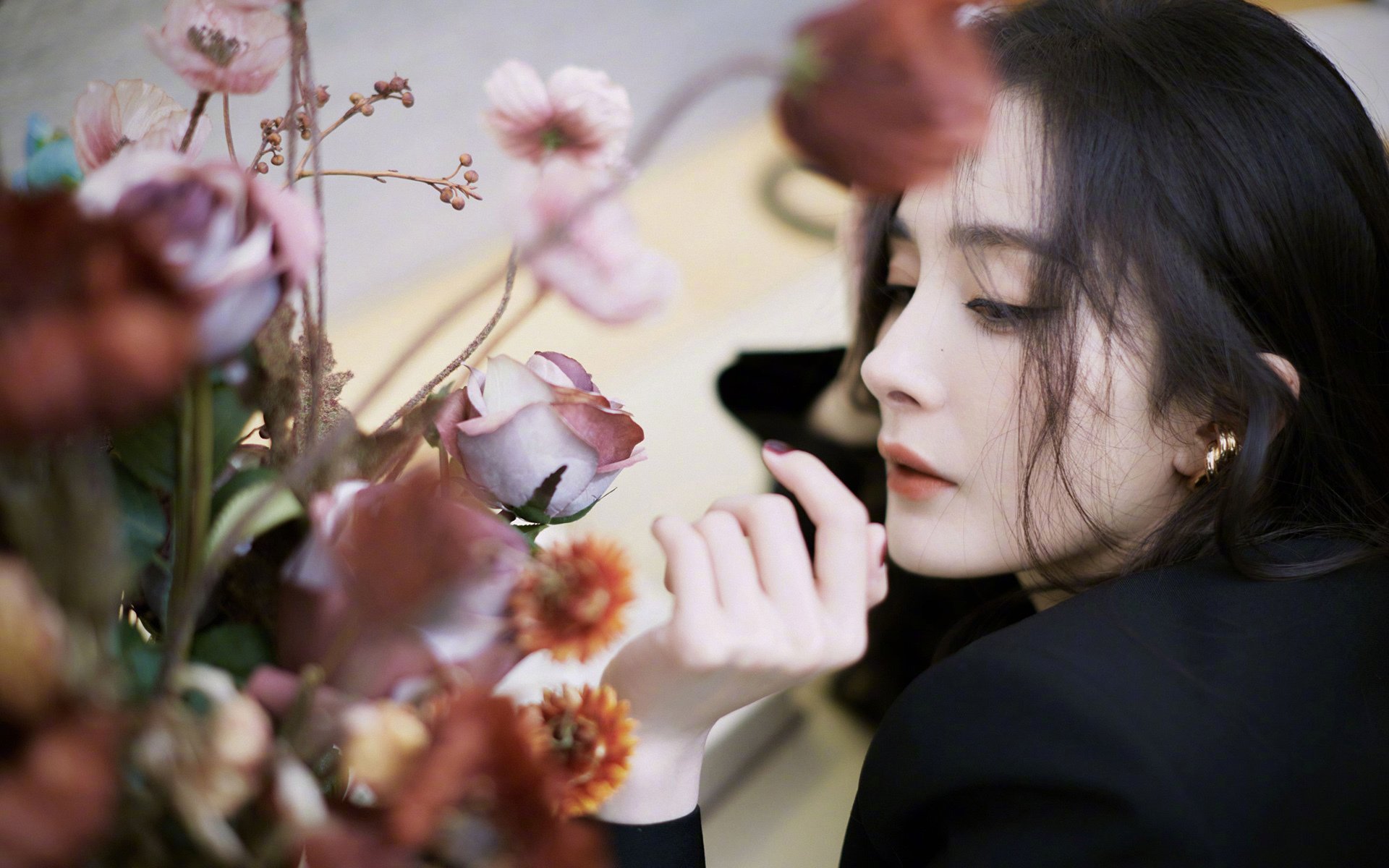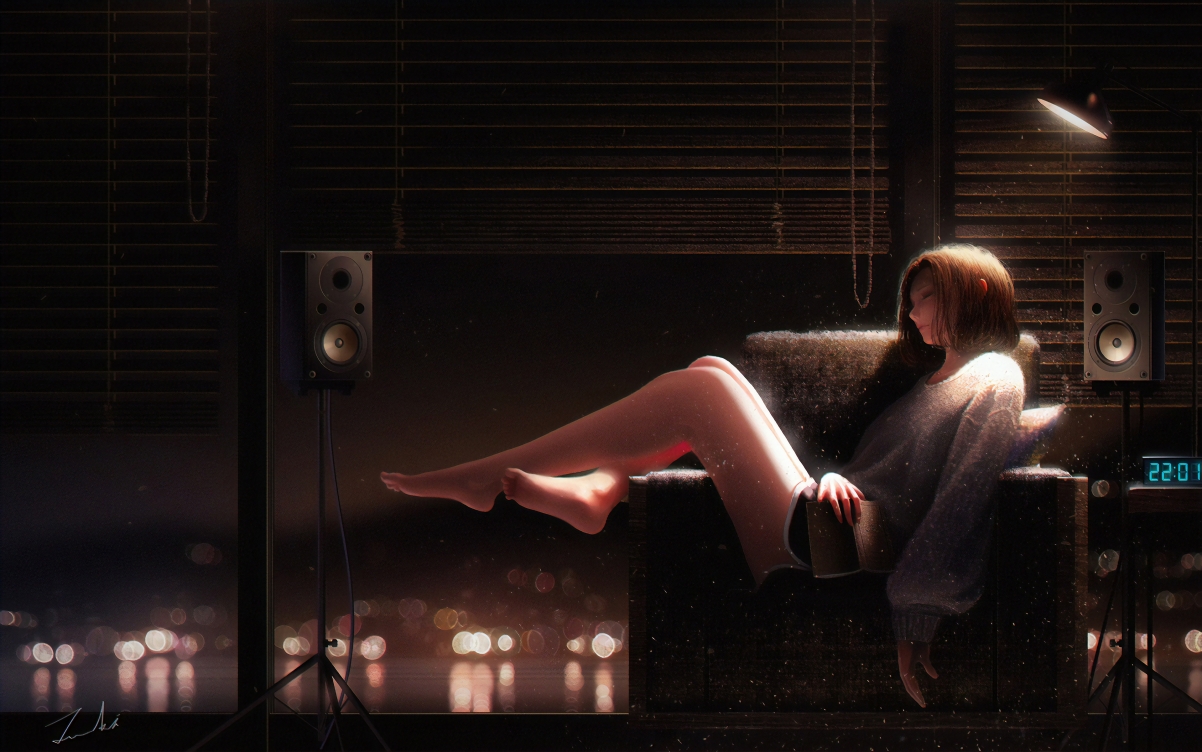My University Days [英汉对照〕
- 教育
- 1周前
- 312
| [日期:2006-03-31] | 来源: 作者: | [字体: ] |
By James Thurber
I passed all the other courses that I took at my University, but I could have never pass botany. This was because all botany students had to spend several hours a week in a laboratory looking through a microscope at plant cells, and I could never see through a microscope. I never once saw a cell through a microscope. This used to enrage my instructor. He would wander around the laboratory pleased with the progress all the students were making in drawing the involved and, so I am told, interesting structure of flower cells, until he came to me. I would just be standing there. "I can‘t see anything," I would say. He would begin patiently enough, explaining how anybody can see through a microscope, but he would always end up in a fury; claiming that I could too see through a microscope but just pretended that I couldn‘t. "It takes away from the beauty of flowers anyway," I used to tell him. "We are not concerned with beauty in this course," he would say. "We are concerned solely with what I may call the mechanics of flars." "Well," I‘d say. "I can‘t see anything." "Try it just once again," he‘d say, and I would put my eye to the microscope and see nothing at all, except now and again a nebulous milky substance.----a phenomenon of maladjustment. You were supposed to see a vivid, restless clockwork of sharply defined plant cells. "I see what looks like a lot of milk," I would tell him. This, he claimed, was the result of my not having adjusted the microscope properly, so he would readjust it for me, or rather, for himself. And I would look again and see milk.
I finally took a deferred pass, as they called it, and waited a year and tried again. (You had to pass one of the biological sciences or you couldn‘t graduate.) The professor had come back from vacation brown as a berry, bright-eyed, and eager to explain cell-structure again to his classes. "Well," he said to me, cheerily, when we met in the first laboratory hour the semester, "we‘re going to see cells this time, aren‘t we?" "Yes, sir," I said. Students to the right of me and left of me and in front of me were seeing cell, what‘s more, they were quietly drawing pictures of them in their notebooks. Of course, I didn‘t see anything.
"We‘ll try it," the professor said to me, grimly, "with every adjustment of the microscope known to man. As God is my witness, I‘ll arrange this glass so that you see cells through it or I‘ll give up teaching. In twenty-two years of botany, I----" He cut off abruptly for he was beginning to quiver all over, like Lionel Barrymore, and he genuinely wished to hold onto his temper; his scenes with me had taken a great deal out of him.
So we tried it with every adjustment of the microscope known to man. With only one of them did I see anything but blackness or the familiar lacteal opacity, and that time I saw, to my pleasure and amazement, a variegated constellation of flecks, specks, and dots. These I hastily drew. The instructor, noting my activity, came from an adjoining desk, a smile on his lips and his eyebrows high in hope. He looked at my cell drawing. "What‘s that?" he demanded, with a hint of squeal in his voice. "That‘s what I saw," I said. "You didn‘t, you didn‘t, you didn‘t!" he screamed, losing control of his temper instantly, and he bent over and squinted into the microscope. His head snapped up. "That‘s your eye!" he shouted. "You‘ve fixed the lens so that it reflects! You‘ve drawn your eye!"
Another course I didn‘t like, but somehow managed to pass, was economics. I went to that class straight from the botany class, which didn‘t help me any in understanding either subject. I used to get them mixed up. But not as mixed up as another student in my economics class who came there direct from a physics laboratory. He was a tackle on the football team, named Bolenciecwcz. At that time had one of the best football teams in the country, and Bloenciecwcz was one of its outstanding stars. In order to be eligible to play it was necessary for him to keep up in his studies, a very difficult matter, for while he was not dumber than an ox he was not any smarter. Most of his professors were lenient and helped him along. None gave him more hints, in answering questions, or asked him simpler ones than the economics professor, a thin, timid man named Bassum. One day when we were on the subject of transportation and distribution, it came Bolenciecwcz‘s turn to answer a question, "Name one means of transportation," the professor said to him. No light came into the big tackle‘s eyes. "Just any means of transportation," said the professor. Bolenciecwcz sat staring at him. "That is" pursued the professor, "any medium, agency, or method of going form one place to another," Bolenciecwcz had the look of a man who is being led into a trap. "You may choose among steam, horse-drawn, or electrically propelled vehicles," said the instructor. "I might suggest the one which we commonly take in making long journeys across land." There was a profound silence in which everybody stirred uneasily, including Bolenciecwcz and Mr. Bassum. Mr. Bassum abruptly broke this silence in an amazing manner. "Choo-choo-choo," he said, in a low voice, and turned instantly scarlet. He glanced appealingly around the room. All of us, of course, shared Mr. Bassum‘s desire that Bolenciecwcz should stay abreast of the class in economics. For the game, one of the hardest and most important of the season, was only a week off. "Toot, toot, too-toooooot!" some student with a deep voice moaned, and we all looked encouragingly at Bolenciecwcz. Somebody else gave a fine imitation of a locomotive letting off steam. Mr. Bassum himself rounded off the little show. "Ding, dong, ding, dong," he said, hopefully. Bolenciecwcz was staring at the floor now, trying to think, his great brow furrowed, his huge hands rubbing together, his face red.
"How did you come to college this year, Mr. Bolenciecwcz?" asked the professor. "Chuffa chuffa, chuffa chuffa."
"M‘father sent me," said the football player.
"What‘s on?" asked Bassum.
"I git an ‘lowance," said the tackle, in a low, husky voice, obviously embarrassed.
"No, no." said Bassum, "Name a means of transportation. What did you ride here on?"
"Train," said Bolenciecwcz.
"Quite right," said the professor. "Now, Mr. Nugent, will you tell us----"
If I went through anguish in botany and economics----for different reasons----gymnasium work was even worse. I don‘t even like to think about it. They wouldn‘t let you play games or join in the exercises with your glasses on and I couldn‘t see with mine off. I bumped into professors, horizontal bars, agricultural students, and swinging iron rings. Not being able to see, I could take it but I couldn‘t dish it out. Also, in order to pass gymnasium (and you had to pass it to graduate) you had to learn to swim if you didn‘t know how. I didn‘t like the swimming instructor, and after all these years I still don‘t. I never swam but I passed my gym work anyway, by having another student give my gymnasium number (978) and swim across the pool in my place. He was a quiet, amiable blonde youth, number 473, and he would have seen through a microscope for me if we could have got away with it, but we couldn‘t get away with it. Another thing I didn‘t like about gymnasium work was that they made your strip the day you registered. It is impossible for me to be happy when I am stripped and being asked a lot of questions. Still, I did better than a lanky agricultural student who was cross-examined just before I was. They asked each student what college he was in----that is, whether Arts, Engineering, Commerce, or Agriculture. "What college are you in?" the instructor snapped at the youth in front of me. "
It wasn‘t that agricultural student but it was another a whole lot like him who decided to take up journalism, possibly on the ground that when farming went to hell he could fall bake on newspaper work. He didn‘t realize, of course, that that would be very much like falling back full-length on a kit on carpenter‘s tools. Haskins didn‘t seem cut out for journalism, being too embarrassed to talk to anybody and unable to use a typewriter, but the editor of the college paper assigned him to the cow barns, the sheep house, the horse pavilion, and the animal husbandry department generally. This was a genuinely big "beat," for it took up five times as much ground and got ten times as great a legislative appropriation as the . The agricultural student knew animals, but nevertheless his stories were dull and colorlessly written. He took all afternoon on each one of them, on account of having to hunt for each letter on the typewriter. Once in a while he had to ask somebody to help him hunt. "C" and "L", in particular, were hard letters for him to find. His editor finally got pretty much annoyed at the farmer-journalist because his pieces were so uninteresting. "See here, Haskins," he snapped at him one day, "why is it we never have anything hot from you on the horse pavilion? Here we have two hundred head of horses on this campus----more than any other university in the Western Conference except Purdue----and yet you never get any real low down on them. Now shoot over to the horse barns and dig up something lively." Haskins shambled out and came back in about an hour; he said something. "Well, start it off snappily," said the editor. "Something people will read." Haskins set to work and in a couple of hours brought a sheet of typewritten paper to the desk; it was a two-hundred word story about some disease that had broken out among the horses. Its opening sentence was simple but arresting. It read:" Who has noticed the sores on the tops of the horses in the animal husbandry building?"
大学生涯
詹•瑟伯
我大学所修各门课程都通过了,但就是过不了植物学这一关,这是因为,凡是修植物学课程的学生都必须每周在实验室里呆上若干小时,透过显微镜观看植物细 胞,而我却总是看不透显微镜。我从未透过显微镜看见过一个细胞,这每每令我的老师勃然大怒。他总是在实验室踱来踱去,为所有学生在绘画有关的花朵细胞的结 构上所取得的进步而高兴,大家告诉我那是很有意思的结构。最后他来到我面前,我则往往站在那儿,说道:“我什么也看不见。”他开始说话时总是很耐心,说明谁都能看显微镜,但又总是以怒不可遏告终。他宣称,我也能看透显微镜,只是假装不能而已。我对他说:“不管怎样,这都剥夺了花的美。”他则说:“这门课程讲的不是美,而主要是姑妄称之为花的结构。”“唔,”我说,“我什么也看不见。”“再试一次,”他说,于是我便把眼睛放在显微镜上,除了偶尔看见一种模糊的乳状物质之外,根本什么也看不见,而这种模糊的乳状物质则是一种调试失当的现象。你应该看见轮廓醒目的植物细胞,它们形似时钟机构,生动鲜明,动作不停。“我看到的就象大量牛奶。”我告诉他,而他则声称,这是由于我没能调好显微镜所致,因而他就为我调试,更确切的说是为他自己调试,而我再次观看,又看见牛乳。
最后我得了个延期及格,他们是这样称呼的,我又等了一年再试一次。(你必须通过一门生物学类的课程,否则不予毕业。)教授度假后归来,脸晒得黝黑象个浆果,眼睛发亮,一片热诚要向各班学生再次讲解细胞的结构。我们在开学后第一堂试验课上见了面,他兴高采烈地对我说,“唔,这次我们会看见细胞的,对吗?”“对,先生,”我说道。在我的右方、左方和前方的学生正在看到细胞,不仅如此,他们还在静静地在笔记本上绘制细胞图画。当然,我什么也没有看见。
教授严厉的对我说,“我们将用人类所知的每一种调试显微镜的方法再试一次。上帝作证,我要为你调试这个显微镜,让你透过它看见细胞,若不然这个书我就不教了。我教了22年的植物学----”他突然缄口不言,因为他全身颤抖了起来,就向莱昂内尔•巴里莫尔一样。他确实想控制住自己的情绪,他跟我发的那些脾气已使他大伤元气。
因而我们尝试着用人类所知的每一种调试显微镜的方法进行调试。只有一次我没有看见漆黑一片或者那种熟悉的乳状混浊物。那一次我看见由斑斑点点组成的灿烂 群星,不禁惊喜交加,于是匆匆把这灿烂群星画了下来。老师见我忙个不停,于是从邻座走来,笑容可掬,眉开眼笑,满怀希望。他看了看我画的细胞。“这是什么?”他诘问道,埋怨之情溢于言表。“这是我看到的。”我说道。“不是,不是的,不是!”他尖叫着,顿时大发雷霆,并且弯下身来,迷着眼睛朝显微镜里望去。他猛地抬起头来。“这是你的眼睛!”他喊道,“你调的镜头反射了!你画的是你的眼睛!”
还有一门课程我不喜欢,却又终得通过,那就是经济学。我上完植物学课后直接去上经济学课,不过这对于我理解这两门科目都毫无帮助。我每每把这两门课混淆 起来。但跟直接从物理实验室来经济学班上课的另一个学生相比,我的混淆程度倒也略逊一筹。他是校橄榄球队的一名后卫,名叫博伦虬茨威克兹。那时俄亥俄州立 大学拥有一支国内最好的球队,博伦虬茨威克兹又是它的一名最杰出的球星。要获得打球的资格,他的学习就必须跟上趟,这可是一件极其困难的事情,因为他虽说 并不必公牛苯,却也聪明不到哪里去。他的教授大都对他宽宏大量,始终助他一臂之力。而在教授当中,经济学教授又在他回答问题时给他最多的暗示,问他的问题 也最简单。经济学教授是一个瘦削、胆小的人,名叫巴瑟姆。一天,我们学习有关运输和分配的问题,又轮到博伦虬茨威克兹回答问题了。“说出一种运输工具的名称。”教授对他说。这位大个子后卫的眼睛里并未出现什么光彩。“什么运输工具都行。”教授说道,博伦虬茨威克兹坐着干瞪眼。“也就是说,”教授循循善诱,“是从一个地方到另一个地方的任何手段、媒介或方法。”博伦虬茨威克兹的表情就象被引入陷阱一般。“你可以在蒸汽、马拉或者电力驱动的运载工具当中进行选择,”老师说道,“我建议你说说我们陆路长途旅行通常使用的那一种。”班上一片沉寂,大家都不安地移动着身子,博伦虬茨威克兹和巴瑟姆先生也不例外。巴瑟姆先生突然他破了这种寂静,那幅样子让人大吃一惊。“噗-噗-铺。”他小声说道,登时满脸绯红。他恳求地瞥了全班同学一眼。当然,我们都与巴瑟姆先生怀有同样的愿望,希望博伦虬茨威克兹能与这个经济学班上的同学并肩前进,因为这个赛季的一场最为艰巨、最为重要的比赛,也就是那场伊利诺斯比赛,一个星期以后就要举行了。“嘟,嘟,嘟-嘟......!”有个学生低吟道,我们都用鼓励的目光看着博伦虬茨威克兹,又有一个人模仿了火车头放气的声音,模仿得惟妙惟肖。巴瑟姆先生本人则圆满地完成了这个小小的演出。“叮当,叮当。”他说道,满怀着希望。此刻博伦虬茨威克兹正盯着地板,尽力在思考,巨大的前额紧锁着,两只大手揉来揉去,满脸通红。
“今年你是怎么来学校的,博伦虬茨威克兹先生?”教授问道,“咔嚓,咔嚓,咔嚓。”
“我爸爸送我来的,”这位橄榄球队员说道。
“靠的是什么?”巴瑟姆说道。
“我得到了一笔津贴,”这位后卫说道,嗓音低沉、沙哑,显然困窘不安。
“不,不,”巴瑟姆说道,“说出一种运输工具的名称,你是乘坐什么来的?”
“火车,”博伦虬茨威克兹说道。
“完全正确,”教授说道,“现在,纽金特先生,你能不能告诉我们----”
如果说我是极度痛苦地上了植物学和经济学课----痛 苦的原因不同,那么体育课就痛苦愈甚。真是不堪回首。他们不让你带着眼镜打球跑步或者做体操,可是我一摘了眼镜就两眼一团黑。我撞上了教练,撞上单杠,撞 上农科学生,撞上摆动着的铁环。由于看不见,因而我可以上这门课,但却不能执行它。而且,为了通过体育课(你须通过方可毕业),你如果不会游泳就得学会。 我不喜欢游泳池,不喜欢游泳,不喜欢游泳老师,而且过了这么多年还是不喜欢。我从未游过泳,却又终究通过了体育课,那时让另一位学生用我的体育课号码(978),代替我又过了游泳池。他是个沉默寡言、性情温和的金发青年,473号, 要是我们能不被发现的话,他也会替我看显微镜的,但我们做不到不被发现。体育课的另一件讨厌事就是注册时得脱光衣服。我脱光衣服又被询问许多问题,自然是 高兴不起来的。尽管如此,但我还是没有差到那位就在我前面被盘诘的瘦高个子农科学生那种程度。他们问每一个学生是哪个学院的----也就是说,到底是艺术学院,工学院,商学院,还是农学院。“你是哪个学院的?”老师猛地询问我前面那位青年。“俄亥俄州立大学。”他冲口而出。
作出学新闻的决定的,并不是那位农科学生,而是另外一个十分象他的学生,也许是基于下述理由,即一旦农业垮台他就可转而从事报业。当然,他并没有意识 到,那样做与向后倒在一套木工工具箱上没有什么两样。哈斯金斯似乎天生就不是搞新闻的材料,他与人交谈时手足无措,也不会打字,不过校刊编辑还是派他去牛 棚、羊舍、马厩及一般的畜牧部门进行报道。这是一个真正巨大的“采访领域”,因为上述畜牧部门占地面积是文学院的五倍,所获得的立法机关的拨款是文学院的十倍。这为农科学生了解动物,但他的文笔单调而毫无色彩。他每写一篇都花上整整一个下午的时间,因为他得在打字机上寻找每一个字母。每过一会儿他就得请人帮他寻,“C”和“L”这两个字母他尤难觅到。他的编辑终于对这位农夫记者不胜其烦,因为他的文章太索然乏味了。“我说,哈斯金斯,”有一天编辑对他厉声说道,“我们怎么从未从你那儿得到有关马厩的有滋有味的报道呢?咱们学校有200匹马----比加入西部联合会的哪一所大学都多,除了普渡大学之外----可你从未真正把它们写进去。喂喂,赶快到马棚去,挖掘出点活生生的东西。”哈金斯金踉跄地出去了,大约一个小时以后又返回,他说他已有所得。“唔,赶快动手,”编辑说道,“写出点人家乐意看的东西。”哈斯金斯开始写作,几个小时后带来一张打好字的纸,放在桌上。这是一篇200字的文章,讲的是马群当中爆发的一种疾病。文章开头的那句话简单却又颇为醒目。那句子是:“有谁注意到,畜牧楼里马的头顶上长了疮。"
下一篇
法国酒标词解(三)








